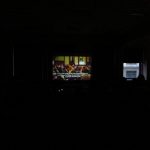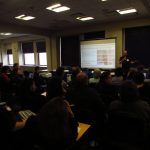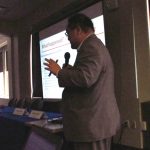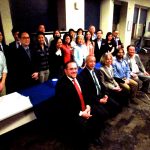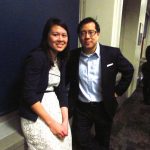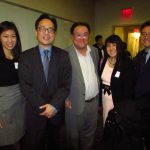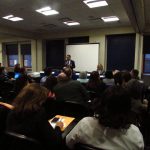On Friday, April 17, the Korean American League for Civic Action (KALCA) and AABANY teamed up at the CUNY’s Asian American/Asian Research Institute (AAARI-CUNY) to present a forum on the proposed revisions to the Specialized High School Admissions Test (SHSAT). With almost 100 people registered for the event, the community gathered to hear from opposing sides of the SHSAT issue.
The panelists, moderated by Clara Hemphill of InsideSchools.org were:
Jonathan Halabi
UFT Chapter Leader, High School of American Studies
Co-Chair of UFT Specialized High School Task Force
Rachel M. Kleinman
Senior Counsel, NAACP Legal Defense Fund
Edward Q. Seto
Former School Superintendent in NYC
Former High School Principal
Mike M. Mascetti
Executive Director, The Science Schools Initiative
For those not familiar with the issue, there is a special category of high schools in New York City, including Stuyvesant, Brooklyn Tech, and Bronx Science, that have a single criterion for admission – high performance on the SHSAT. Without regard to any other factor, admissions based on the test at these high schools – as opposed to other specialized screened high schools and other high schools in New York City – has led to an overwhelming majority of the students coming from Asian American families. Despite the SHSAT high schools having reported some of the most socioeconomically diverse students – a large number of students coming from poor Asian immigrant households – the NAACP Legal Defense and Education Fund filed a complaint in September 2012 against the New York City Department of Education and the New York State Department of Education alleging that the SHSAT led to a disparate impact on black and latino applicants for specialized high school admissions, in violation of the Civil Rights Act of 1964.
The panel discussed the lack of good high school options for students from all boroughs, whether the students who did not perform on the test could compete with their peers who had, and whether the students at these high schools actually out-performed other advanced high schools. In fact, the panel found that it agreed on quite a bit – that it is a shame that there are not better options for black and Latino neighborhoods, that awareness needs to be raised about the test, and that the state of options for underprivileged students of all minority backgrounds – black, Latino, and Asian students – is an embarrassment.
The evening began with AABANY’s Labor & Employment Law Committee Co-Chair Chris Kwok introducing the history and background of the SHSAT, to place the discussion in its proper context. Between the panel and the question-and-answer segment of the panel, we were lucky enough to see a screening of Tested, a documentary about a diverse group of eighth graders struggling to gain admission to one of these elite high schools. Visit their website for more information.
Thank you to all those who made the evening possible: everyone from KALCA, Issues Committee Chair Relic Sun, Labor & Employment Law Committee Co-Chair Chris Kwok, Government Service & Public Interest Committee Co-Chair Karen Yau, all panelists, AAARI-CUNY for hosting, and all those who attended.
Stay tuned for more news about the SHSAT.
For the live-feed of the event, read below:
Can’t wait to see everyone at the #SHSAT Forum tonight! @TestedFilm @aaaricuny @chrismkwok @CivicLeaders @Insideschools
#SHSAT Forum intro by @Chrismkwok of @aabany: our view of the issue takes place w/ in complexities transformed by the Civil Rights movement
#SHSAT forum question #1: Should the test be scrapped?
#SHSAT forum question #2: What’s wrong with having 73% Asian students at Stuyvesant?
#SHSAT forum panelist Mike Mascetti: Asian American students make up a diverse pool of students, many low income…
#SHSAT forum panelist Edward Seto: We need to look @ the root cause of why our schools are not diverse.
#SHSAT forum panelist Rachel Kleinman of @NAACP_LDF: The more measures you introduce to the test, you start to eliminate the bias
#SHSAT forum question: Do #SHSAT scores indicate a student’s level of success once in school?
#SHSAT forum panelist Jonathan Halabi: Have measures such as zip code diversity, top performers across schools, etc.
#SHSAT forum: Only 6% of students at Bronx Science are from the Bronx
#SHSAT forum question: What do you say about having to pay extensively for test prep?
#SHSAT forum panelist Edward Seto: Put the (public) dollars up in allowing students access to prep for the test.
#SHSAT forum panelist Mike Mascetti: To some access to screened high schools are often more difficult than #SHSAT.
#SHSAT forum panelist Jonathan Halabi: …shortage of seats for students. Every neighborhood high school should have a good honors program.
#SHSAT forum panelist Edward Seto: We don’t have a coherent rigorous curriculum that teachers can follow… contributing factor to issue
Following a great panel, the #SHSAT forum is showing a clip of @TestedFilm! Can’t wait for the Q&A. pic.twitter.com/Tx48sPrE78
#SHSAT forum taking audience questions… tweet at us or @aabany your Qs!
Welcome @WNYC to #SHSAT forum!
Big shout-out to panelists and organizers who made this great panel on the SHSAT possible, including: @CivicLeaders @chrismkwok @aaaricuny


